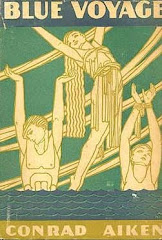
Joe May and Gustav Fröhlich (both sitting, from left to right) on the set of "Heimkehr" (1928)
Lowry describes Joe May's film Heimkehr(The Homecoming) as a "wonderful wonderful film" in a letter to Clemens ten Holder dated 31st October 1951.
Joe May (November 7, 1880 in Vienna - April 29, 1954 in Hollywood), born Julius Otto Mandl, was a film director and film producer born in Austria, one of the pioneers of German cinema.
After studying in Berlin and a variety of odd jobs, he began his career as a stage director of operettas in Hamburg before starting to make films from 1912 in Berlin. In 1902 he had married the actress Mia May (born Hermine Pfleger) and took his stage name from hers.
In 1914 he founded his own film production company, May-Film, and began to produce a successful series of crime films, whose detective hero went by the name of Joe Deebs. Some of these were directed by May himself, others by Harry Piel. (Around the same time May also worked on the Stuart Webbs series of detective films for another company). In 1917 he gave Fritz Lang one of his earliest breaks in the film industry as screenwriter on the film Die Hochzeit im Excentricclub (Wedding in the Eccentric Club) and Lang also worked on other May films at this time.
After the end of World War I in 1918 May's company built film studios in the Berlin suburb of Weissensee and in Woltersdorf a village northeast of Berlin in Brandenburg. There he went on to produce and direct a series of popular and exotic adventure films, among them the monumental three hour long Veritas vincit (1919), the eight-part series Die Herrin der Welt (Mistress of the World) (1919-20) as well as the two-part adventure film Das indische Grabmal (The Indian Tomb) (1921) starring Conrad Veidt and written by Fritz Lang and Thea von Harbou.
These featured Mia May in leading roles and she regularly worked under her husband's direction in a number of melodramas like Tragödie der Liebe (1922/23) costarring Emil Jannings. Their teenage daughter Eva May (born 1902 in Vienna) tried to build her own career as an actress but committed suicide in 1924 after the end of her third marriage with the film directors Manfred Liebenau, Lothar Mendes and Manfred Noa.
Towards the end of the 1920s, May moved away from adventure films and produced more realist works, notable among them the World War I love-triangle Heimkehr (The Return Home) (1928) and the contemporary thriller Asphalt (1929). During the early years of sound film he worked as a producer for Erich Pommer at Ufa then for different production companies in Germany, Austria and France directing a series of multilingual versions in German and French among those is Ihre Majestät die Liebe / Son altesse l'amour (1930) one of the best musical comedies of the Weimar Cinema.
Wikipedia

Joe May's film does not appear to be available nor are there any clips on Youtube or elsewhere. Here is a synopsis of the film:
Richard and Karl are German prisoners of war in Siberia. Since escape is almost impossible, they are unguarded and live an almost idyllic existence running a ferry. Richard misses his wife Anna greatly; he literally counts the days since he's seen her and tells Karl about her and their home in detail. When he decides to escape, Karl comes with him. While crossing a desert Richard collapses. He asks Karl to go on without him, but Karl refuses to leave his friend and carries him. But when Karl leaves to get water, Richard is recaptured and sent to work in a lead mine. Karl makes it back to Hamburg, where he meets Anna and occupies a spare room in her flat. Soon friendship deepens, and both he and Anna have guilt feelings about their attraction. Meanwhile the war ends, and Richard returns just in time to witness Karl and Anna's first kiss. After his initial anger, Richard goes to Anna's bed. She cries; he takes her in his arms; she returns his embrace; but when he begins to make love to her, she refuses his advances. Richard returns to the room where Karl pretends to be asleep. He takes a pistol and prepares to kill Karl; but as he holds the gun to Karl's head, he recalls his friend's carrying him across the desert and puts the pistol away. Realizing that "Nobody's to blame," Richard leaves Karl and Anna to each other and returns to his other great passion, life at sea on one of the great freighters that sail from Hamburg. Wikipedia

The film starred Lars Hanson and Dita Parlo in the lead characters of Karl and Anna.


It is possible to see the quality of May's work in his film Asphalt (1929) which is available on DVD. However, I cannot find any reference in Lowry's work or letters to Asphalt, which doesn't mean that he didn't see the film, especially given his love of German films and his prolific viewing of movies.







No comments:
Post a Comment